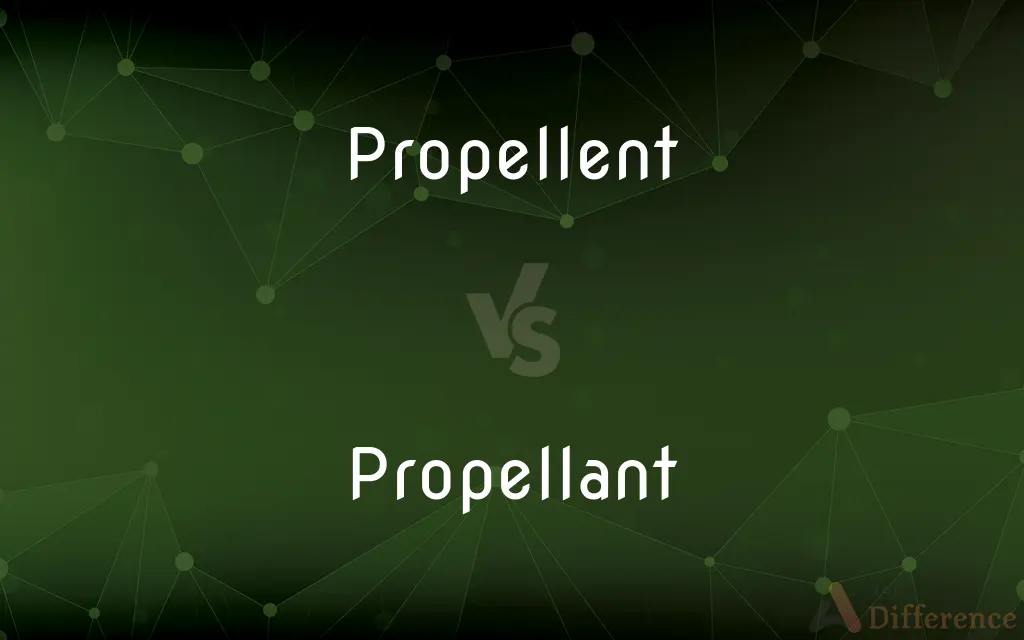Propellent vs. Propellant — What's the Difference?
By Tayyaba Rehman & Maham Liaqat — Updated on April 5, 2024
Propellant is the correct spelling for substances that propel objects, while "propellent" is a less common variant.

Difference Between Propellent and Propellant
Table of Contents
ADVERTISEMENT
Key Differences
Both "propellant" and "propellent" refer to a substance used to drive forward or propel an object, such as in rockets, aerosol sprays, and firearms. The primary difference between the two lies in their spelling and usage frequency. "Propellant" is the widely accepted and commonly used term, especially in scientific and technical contexts. On the other hand, "propellent" is considered a less common variant and might be seen in some instances, but it is not the preferred spelling in most authoritative sources.
The functionality and purpose of a propellant are to generate thrust, making it possible to move an object through or out of the atmosphere by overcoming gravity and resistance. This can be achieved through chemical means, where a reaction produces gases at high pressure and temperature, or through physical means, such as compressed gases expanding to produce thrust.
Despite the spelling differences, when either term is used, it typically refers to the same concept — a substance that provides the necessary force to propel something. However, it's essential to use "propellant" in formal writing and documentation to align with standard conventions.
Both "propellant" and "propellent" can be used in various applications, including in aerospace for rocket fuel, in everyday items like aerosol cans, and in the automotive industry in airbag inflators. The effectiveness of a propellant is measured by its specific impulse, or the thrust provided per unit of propellant consumed, indicating the efficiency of the propellant in producing forward motion.
The choice between "propellant" and "propellent" does not affect the understanding of the term’s function or application but rather reflects adherence to standard spelling conventions. "Propellant" is recommended for clarity and consistency, especially in technical and academic contexts.
ADVERTISEMENT
Compare with Definitions
Propellent
Something, such as an explosive charge or a rocket fuel, that propels or provides thrust.
Propellant
A propellant or propellent is a chemical substance used in the production of energy or pressurized gas that is subsequently used to create movement of a fluid or to generate propulsion of a vehicle, projectile, or other object. Common propellants are energetic materials and consist of a fuel like gasoline, jet fuel, rocket fuel, and an oxidizer.
Propellent
A compressed inert gas, such as a fluorocarbon, that acts as a vehicle for discharging the contents of an aerosol container.
Propellant
Something, such as an explosive charge or a rocket fuel, that propels or provides thrust.
Propellent
Serving to propel; propelling.
Propellant
A compressed inert gas, such as a fluorocarbon, that acts as a vehicle for discharging the contents of an aerosol container.
Propellent
Alternative spelling of propellant
Propellant
Serving to propel; propelling.
Propellent
Capable of propelling.
Propellant
Anything that propels
Propellent
Something that propels
Propellant
Fuel, oxidizer, reaction mass or mixture for one or more engines (especially internal combustion engines or jet engines) that is carried within a vehicle prior to use
Propellent
Tending to or capable of propelling;
Propellant fuel for submarines
The faster a jet plane goes the greater its propulsive efficiency
Universities...the seats of propulsive thought
Propellant
The compressed gas in a pressurised container (especially an aerosol can) that is used to expel its content
Propellant
The explosive cordite, gunpowder, etc found in ammunition cartridges
Propellant
Alternative spelling of propellent
Propellant
Something that propels
Propellant
Tending to or capable of propelling;
Propellant fuel for submarines
The faster a jet plane goes the greater its propulsive efficiency
Universities...the seats of propulsive thought
Share Your Discovery

Previous Comparison
Salary vs. Payroll
Next Comparison
Durry vs. CigaretteAuthor Spotlight
Written by
Tayyaba RehmanTayyaba Rehman is a distinguished writer, currently serving as a primary contributor to askdifference.com. As a researcher in semantics and etymology, Tayyaba's passion for the complexity of languages and their distinctions has found a perfect home on the platform. Tayyaba delves into the intricacies of language, distinguishing between commonly confused words and phrases, thereby providing clarity for readers worldwide.
Co-written by
Maham Liaqat














































